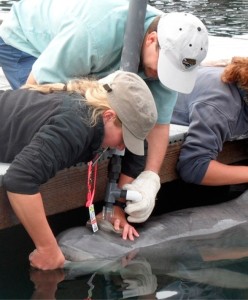
The dolphin ‘breathalyzer’ will analyze the for health problems and aid in wildlife conservation.
Credit: American Chemical Society
While breath analysis is most commonly known for its ability to detect alcohol consumption, it has the potential to extend far beyond that use. Breath analysis has the ability to diagnose a wide range of human conditions, and is now being utilized to aid the bottlenose dolphin.
Engineers from the University of California, Davis have developed a device for collecting dolphin breath for analysis. Because invasive techniques such as skin biopsies and blood sampling are difficult to perform on wild dolphins, this device will make it easier to check the health of the marine animals, study their biology, and aid in wildlife conservation.
This from UC Davis:
The researchers designed an insulated tube that traps breath exhaled from a dolphin’s blowhole and freezes it. They analyzed samples to create profiles of the mix of metabolites in breath, established baseline profiles of healthy animals and were able to identify changes in the breath of animals affected by disease or other factors. The researchers concluded that breath analysis could be used to diagnose and monitor problems in marine mammals – and, by extension, in ocean health as well.
The importance of this device cannot be understated for the preservation of the bottlenose dolphin. According to the National Oceanic and Atmospheric Administration (NOAA), dolphins have been dying in alarming numbers and experiencing unusual mortality recently.
The device was developed by Professor Cristina Davis and colleagues at the UC Davis Department of Medical and Aerospace Engineering in conjunction with the National Marine Mammal Foundation in San Diego and the Chicago Zoological Society’s Monte Marine Laboratory in Sarasota, Florida.
The research was published in the American Chemical Society journal Analytic Chemistry.
Our scientists are also doing some interesting work in breath analysis. Head over to the Digital Library to check out the latest research. While you’re there, sign up for our e-Alerts, which will notify you when new publications go online and when you can get your hands on new manuscripts.

